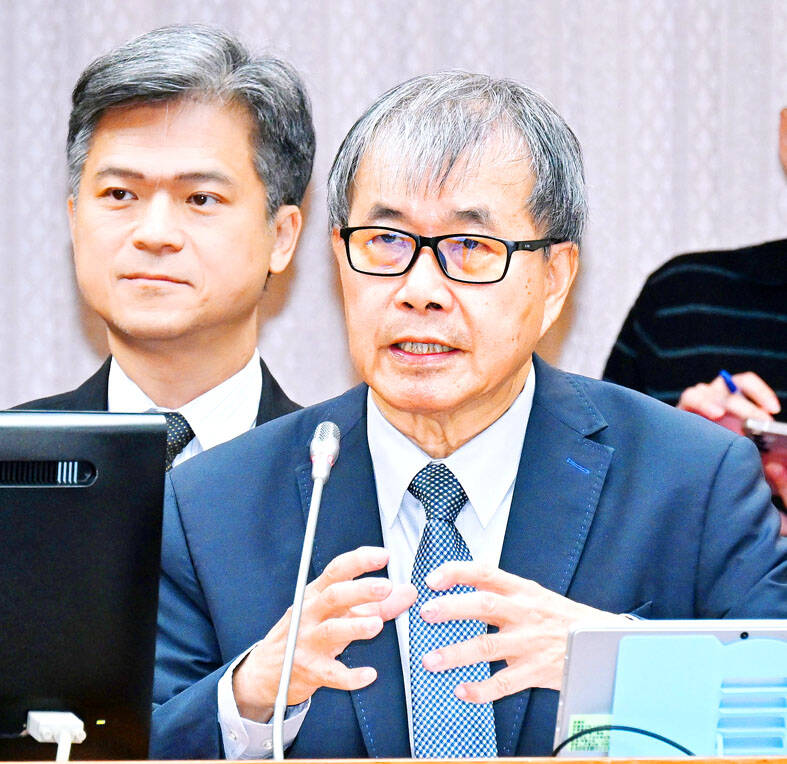Declining enrollment in Taiwan Artificial Intelligence College Alliance (TAICA) courses among university students might be due to member institutions offering their own artificial intelligence (AI) classes outside the alliance framework, Minister of Education Cheng Ying-yao (鄭英耀) said on Thursday.
He made the remarks at a Legislative Yuan meeting after Chinese Nationalist Party (KMT) lawmakers asked him to explain TAICA’s weaker performance in its second semester since its founding.
Citing data from National Taiwan Normal University, KMT Legislator Ko Ju-chun (葛如鈞) said several TAICA courses had zero enrollment.

Photo: Fang Ping-chao,Taipei Times
Participating institutions have reported waning student interest overall, with pass rates for TAICA courses averaging between 50 and 60 percent, he said.
TAICA’s courses might be overly challenging, and the reasons for the drop in enrollment warrant further review, Ko added.
Cheng said TAICA’s online courses were designed to enable well-resourced universities, such as National Taiwan University and National Cheng Kung University, to share teaching staff and resources with other alliance members.
Taiwanese higher education institutions have been opening more AI-related classes on their own, and overall enrollment in AI courses nationwide has increased, indicating reduced reliance on the alliance’s support, he said.
Separately, KMT lawmakers raised concerns over the absence of Deputy Minister of Education Benson Yeh (葉丙成), which has left the ministry with only one of its three legally mandated deputy ministers.
Yeh has been on leave since May, after allegedly leaking the identity of a National Taiwan University student who filed a sexual harassment complaint in a Facebook post.
Yeh’s absence has disrupted ministry operations, but officials handling the case believe more time is needed to complete the investigation in accordance with their legal authority, Cheng said.

Alain Robert, known as the "French Spider-Man," praised Alex Honnold as exceptionally well-prepared after the US climber completed a free solo ascent of Taipei 101 yesterday. Robert said Honnold's ascent of the 508m-tall skyscraper in just more than one-and-a-half hours without using safety ropes or equipment was a remarkable achievement. "This is my life," he said in an interview conducted in French, adding that he liked the feeling of being "on the edge of danger." The 63-year-old Frenchman climbed Taipei 101 using ropes in December 2004, taking about four hours to reach the top. On a one-to-10 scale of difficulty, Robert said Taipei 101

Nipah virus infection is to be officially listed as a category 5 notifiable infectious disease in Taiwan in March, while clinical treatment guidelines are being formulated, the Centers for Disease Control (CDC) said yesterday. With Nipah infections being reported in other countries and considering its relatively high fatality rate, the centers on Jan. 16 announced that it would be listed as a notifiable infectious disease to bolster the nation’s systematic early warning system and increase public awareness, the CDC said. Bangladesh reported four fatal cases last year in separate districts, with three linked to raw date palm sap consumption, CDC Epidemic Intelligence

Two Taiwanese prosecutors were questioned by Chinese security personnel at their hotel during a trip to China’s Henan Province this month, the Mainland Affairs Council (MAC) said yesterday. The officers had personal information on the prosecutors, including “when they were assigned to their posts, their work locations and job titles,” MAC Deputy Minister and spokesman Liang Wen-chieh (梁文傑) said. On top of asking about their agencies and positions, the officers also questioned the prosecutors about the Cross-Strait Joint Crime-Fighting and Judicial Mutual Assistance Agreement, a pact that serves as the framework for Taiwan-China cooperation on combating crime and providing judicial assistance, Liang

US climber Alex Honnold left Taiwan this morning a day after completing a free-solo ascent of Taipei 101, a feat that drew cheers from onlookers and gained widespread international attention. Honnold yesterday scaled the 101-story skyscraper without a rope or safety harness. The climb — the highest urban free-solo ascent ever attempted — took just more than 90 minutes and was streamed live on Netflix. It was covered by major international news outlets including CNN, the New York Times, the Guardian and the Wall Street Journal. As Honnold prepared to leave Taiwan today, he attracted a crowd when he and his wife, Sanni,